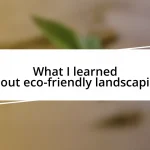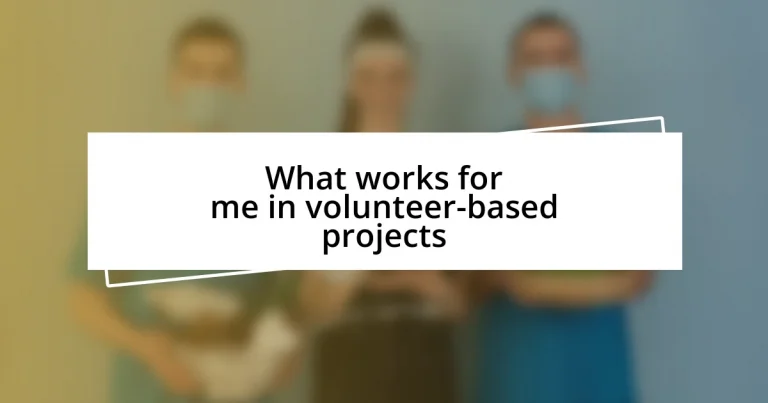Key takeaways:
- Volunteer-based projects foster personal connections and emotional fulfillment while confronting challenges that enhance resilience and adaptability.
- Setting clear, measurable goals engages volunteers, creates a shared vision, and tracks progress, leading to greater motivation and accountability.
- Reflecting on personal growth and motivations during volunteering can deepen understanding, expand skills, and reveal unexpected strengths.
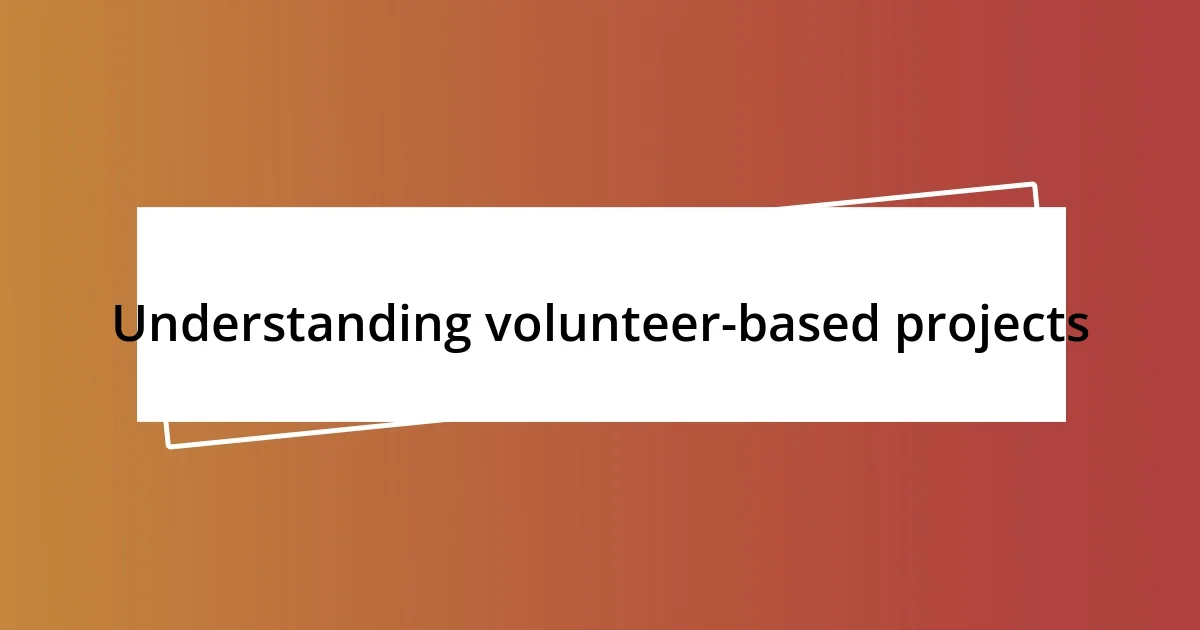
Understanding volunteer-based projects
Volunteer-based projects are unique opportunities that rely on the passion and commitment of individuals willing to give their time for a cause. I remember the first time I participated in a local community garden initiative; the excitement was palpable among us volunteers. We weren’t just planting vegetables but cultivating bonds and a shared purpose, which made the work feel more meaningful.
What really struck me was how diverse these projects can be. Each one carries its own set of goals, challenges, and rewards. For instance, I volunteered with an animal shelter, and the experience taught me that every small task, like cleaning cages or feeding the animals, contributes to a much larger mission. Have you ever wondered how one act of kindness can ripple through a community? It’s incredible to see firsthand how volunteer efforts can spark positive change.
Understanding volunteer-based projects also means recognizing the emotional highs and lows involved. There’s a sense of fulfillment from contributing, but there can also be frustration when things don’t go as planned. In my own experience, I faced challenges while organizing an event where many volunteers canceled last minute. It taught me resilience and the importance of adaptability in these projects. Have you had a moment that taught you something unexpected while volunteering? These reflections often deepen our commitment and understanding of the work we do.
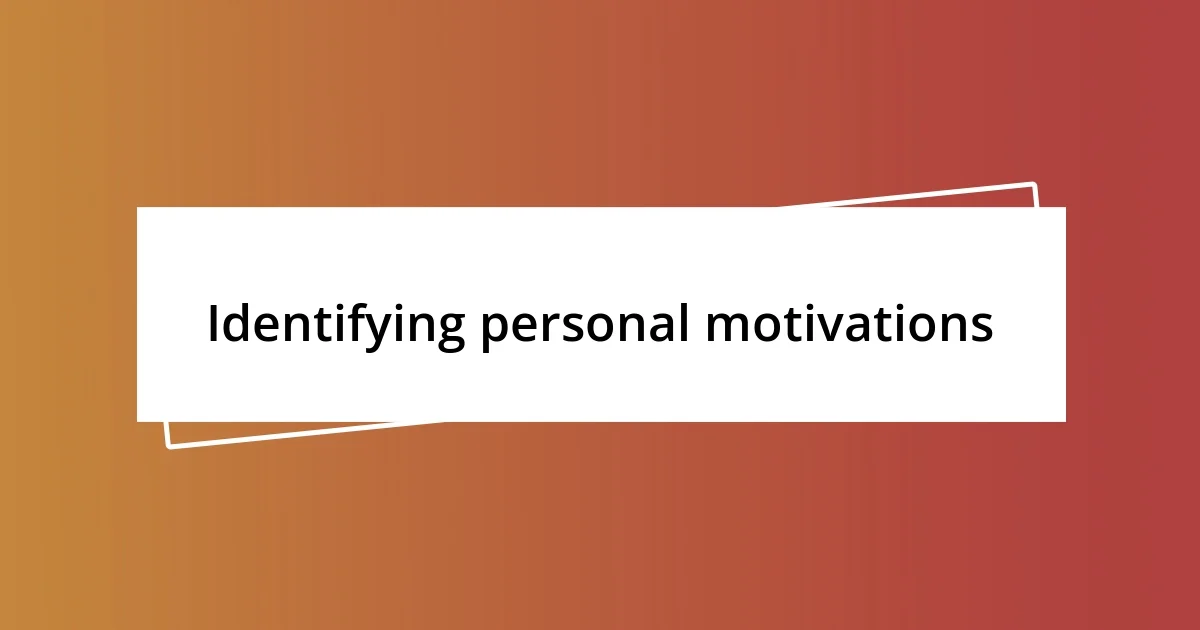
Identifying personal motivations
Identifying personal motivations for volunteering can be a transformative journey. I vividly recall a project where I taught underprivileged children how to read. Initially, I thought my motivation was simply about giving back, but as I started connecting with the kids, I realized it filled a deep-seated desire within me to nurture and inspire the next generation. It was more than just time spent; it awakened a passion for education that I hadn’t fully understood before.
To help clarify what drives you, consider these questions:
- What causes resonate most with me?
- Am I seeking to build new skills, or am I hoping to make a difference?
- How important is social interaction in my volunteering experience?
- Do I want to work alone or as part of a team?
- How does giving back to the community make me feel?
Reflecting on these questions not only clarifies your motivations but also enriches your volunteer experience, making it more enjoyable and fulfilling.
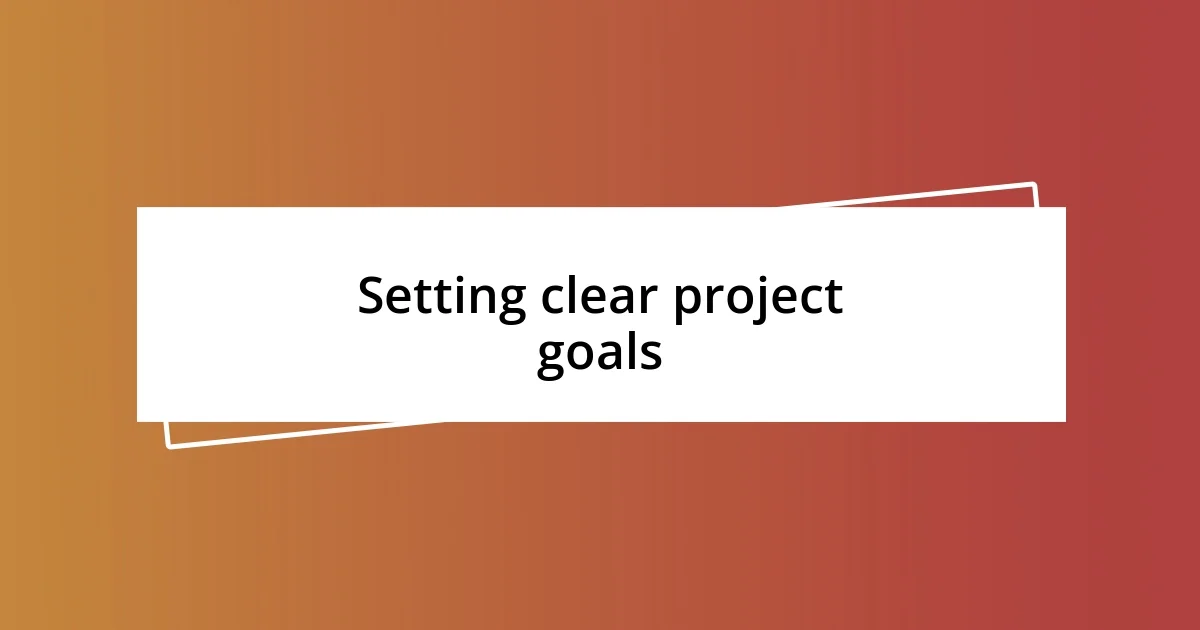
Setting clear project goals
Setting clear project goals is fundamental to the success of any volunteer-based initiative. In my experience with a beach cleanup project, we gathered the team to set specific objectives, like collecting a certain amount of trash or engaging a number of community members. Defining those goals not only focused our efforts but also fueled our motivation, as we could see our progress and celebrate small victories along the way.
Another memorable instance was during my time volunteering at a local food bank. Before starting, we outlined clear and measurable goals, such as distributing meals to a specific number of families each week. This clarity allowed us to allocate resources effectively and track our impact, making the work feel even more rewarding. Honestly, there’s something quite empowering about knowing exactly what you’re working towards, isn’t there?
When setting these goals, remember to involve all volunteers in the discussion. I once participated in a project where input from the team significantly shaped our objectives. This not only fostered a sense of ownership among everyone but also ensured that the goals aligned with the collective passion and skills of the group. Engaging volunteers in goal-setting creates a shared vision that can elevate the entire project.
| Benefits of Clear Goals | Consequences of Lack of Goals |
|---|---|
| Provides focus and direction | Confusion and inefficiency |
| Increases motivation and accountability | Decreased volunteer engagement |
| Facilitates measurement of success | Missed opportunities for reflection |
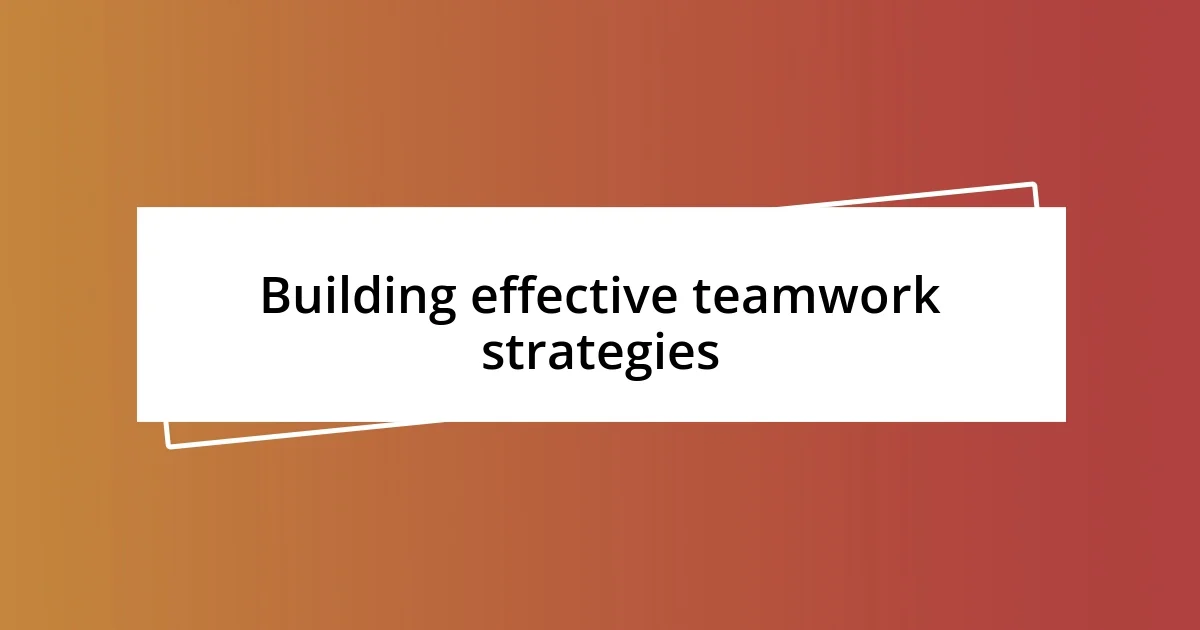
Building effective teamwork strategies
Finding ways to build effective teamwork strategies can truly enhance the volunteer experience, and I can personally attest to this. In one project, we decided to rotate leadership roles during team meetings, which not only diversified perspectives but also empowered everyone to contribute their unique strengths. Doesn’t it feel great when everyone has a voice? That simple strategy transformed our dynamics, making us more cohesive and focused on our shared goals.
Encouraging open communication is another vital aspect of teamwork that I’ve found invaluable. I remember when we faced a challenge during a community garden project; some volunteers felt overwhelmed. By creating an environment where we could express our concerns and ideas freely, we uncovered solutions collectively. This not only alleviated stress but fostered mutual support. Have you noticed how much lighter the burden feels when shared?
Additionally, I believe in celebrating successes, no matter how small! During a recent literacy program, we made a habit of giving shout-outs to team members for their specific contributions. One week, a volunteer organized a fantastic reading event that brought in double the kids we expected, and the entire team rejoiced in that accomplishment. Recognizing individual and team accomplishments strengthens bonds and motivates everyone to keep pushing forward. It made me wonder—what little victories are we missing out on acknowledging in our teams? Making a conscious effort to celebrate can significantly bolster morale and engagement.
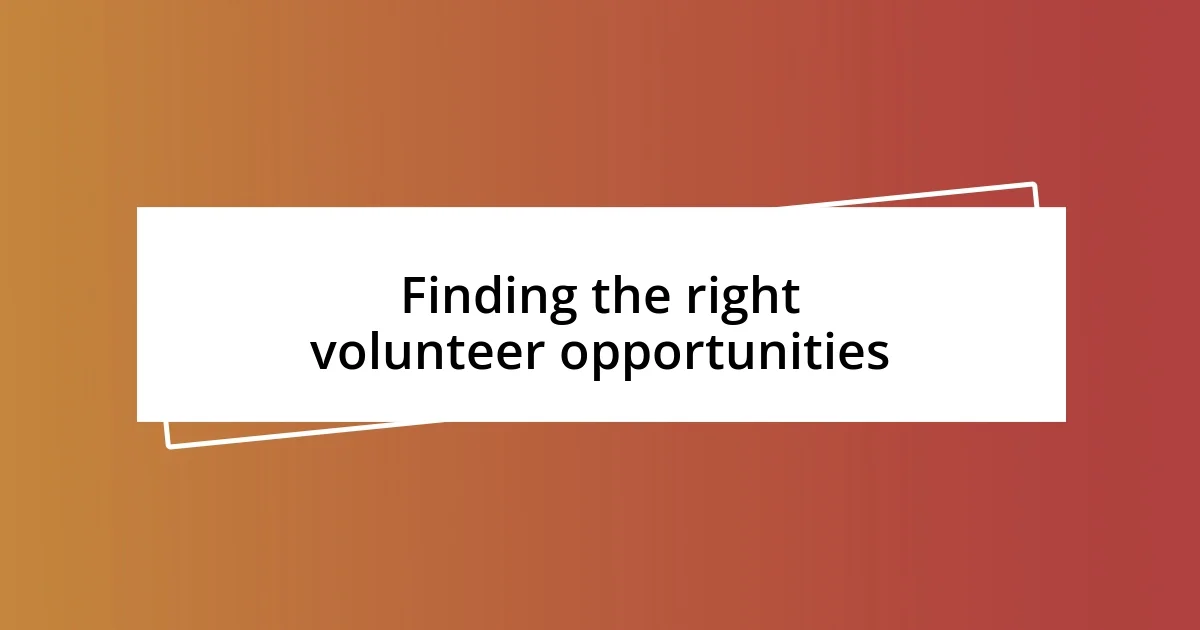
Finding the right volunteer opportunities
Identifying the right volunteer opportunities can sometimes feel overwhelming, given the abundance of choices out there. I very much remember the moment I stumbled upon a local animal shelter looking for foster volunteers. My initial thought was, “Could I really handle that?” But when I visited the shelter, the enthusiasm of the staff resonated with my love for animals, and I knew instantly this was the right fit for me. It’s amazing how aligning your values with an organization’s mission can generate excitement and a sense of belonging.
Another essential aspect is reflecting on your own skills and passions to guide your search. For instance, I once hesitated to join a project focusing on technology education; I didn’t think I had enough knowledge to contribute. However, when I discovered that my organizational skills could help streamline the program’s activities, I realized I could make a genuine impact. Have you ever underestimated what you could offer? Realizing that everyone has unique strengths to bring to the table can open doors to fulfilling volunteer experiences.
Exploring opportunities isn’t just about looking at descriptions but also connecting with people involved in the projects. I’ll never forget chatting with a coordinator before joining a community cleanup. Her stories about the transformations they achieved sparked a fire within me and made the work feel worthwhile. Engaging with individuals passionate about their mission not only provides insight but can also enhance your own motivation. What could a simple conversation reveal about a cause you’re considering? You might just find that spark that drives you to get involved!
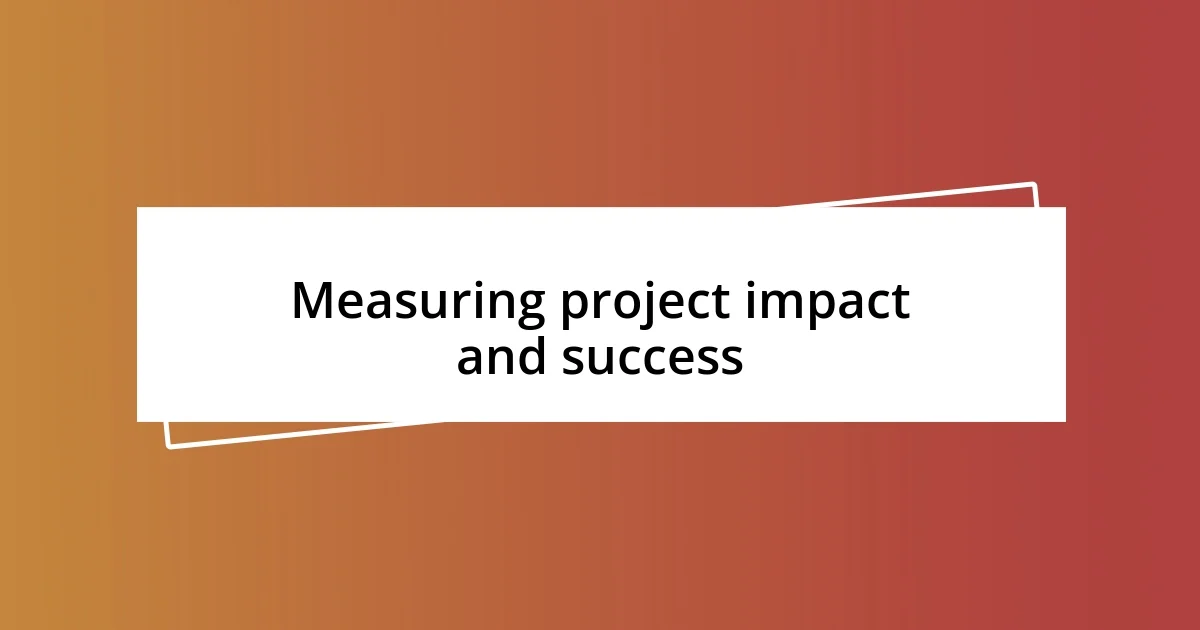
Measuring project impact and success
Measuring project impact and success is where the real magic happens in volunteer-based projects. I recall participating in a youth mentorship program where we set specific benchmarks to evaluate our progress. Each quarter, we gathered feedback from the mentees, and seeing their growth firsthand was incredibly rewarding. It made me reflect: how do we truly know we’re making a difference? This ongoing evaluation process not only highlighted our achievements but also revealed areas for improvement, allowing us to adapt our approaches.
Another aspect I find crucial is collecting qualitative data alongside quantitative metrics. I once worked on a food drive where we shared participant stories in a newsletter. One heartwarming story was from a single mother who expressed how receiving food not only alleviated her financial stress but reinvigorated her hope. This qualitative insight offered a narrative depth that numbers alone couldn’t convey. Isn’t it fascinating how personal stories can underscore the impact of our work in ways statistics sometimes miss?
Finally, I believe in celebrating those impacts collectively with the team. During a recent environmental cleanup, we measured the amount of trash collected and celebrated reaching our goal with a small gathering. Yet, I still remember the moment when a volunteer shared how our work encouraged her children to engage with nature more. Those unexpected results brought tears to my eyes, reminding me that our efforts resonate far beyond what we can immediately track. How often do we take a step back to soak in the broader effects of our contributions? Embracing these moments can reinforce our commitment and inspire us to keep making a difference.
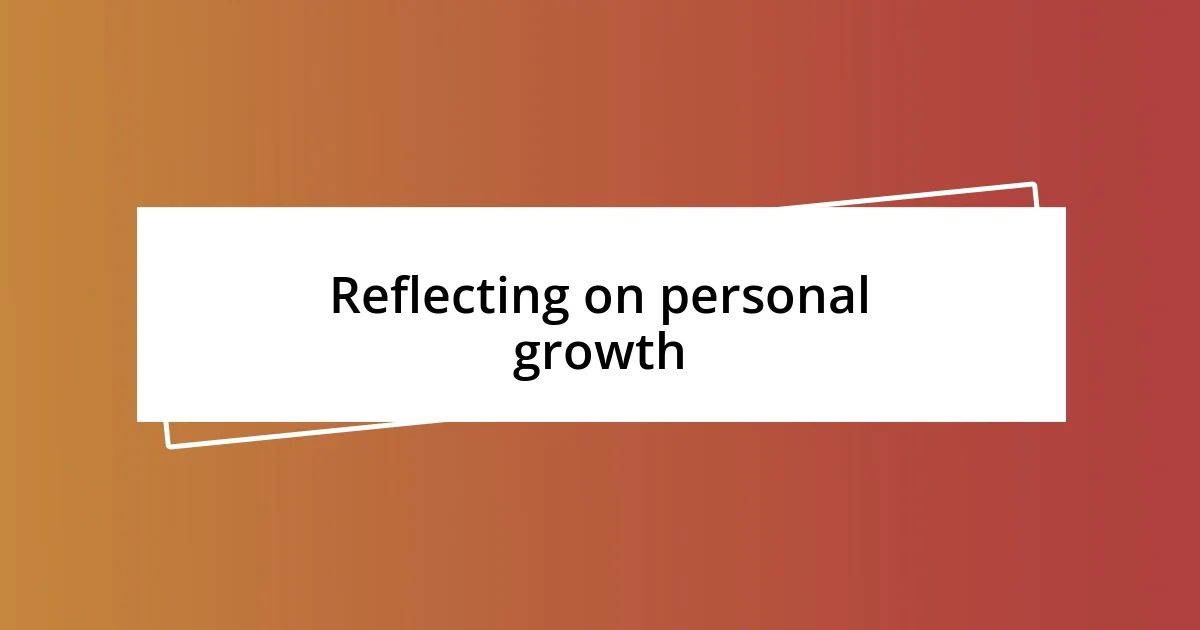
Reflecting on personal growth
Reflecting on personal growth through volunteer experiences has profoundly shaped my life. I remember stepping into a community garden project for the first time, feeling a mix of excitement and nervousness. As I dug into the soil alongside other volunteers, I realized that this hands-on work connected me not only to the earth but also to a diverse community. Have you ever felt that surge of connection when sharing a meaningful task with others? It’s almost as if each moment in that garden taught me more about patience and collaboration than I ever expected.
A particularly memorable instance was helping organize a local book fair. Initially, I was hesitant as I had no prior experience in event planning. However, I quickly discovered the thrill of coordinating logistics and working with a team, each of us contributing unique talents. I found joy in the little victories, like pulling off a successful setup. That experience led me to realize how volunteering can expand our horizons and build confidence. Isn’t it empowering to recognize our capacity to learn and adapt?
Moreover, community service often encourages introspection. After completing a project that focused on mental health awareness, I found myself reflecting on my own perceptions of vulnerability and support. I shared some of my thoughts with a fellow volunteer, and we had a heartfelt conversation about the importance of open dialogue in fostering understanding. Those discussions during my volunteer work helped me grow emotionally and taught me to appreciate the struggles and strengths of others. How often do we overlook the personal journeys that unfold in such collaborative spaces? Each interaction becomes a stepping stone in our own development.











